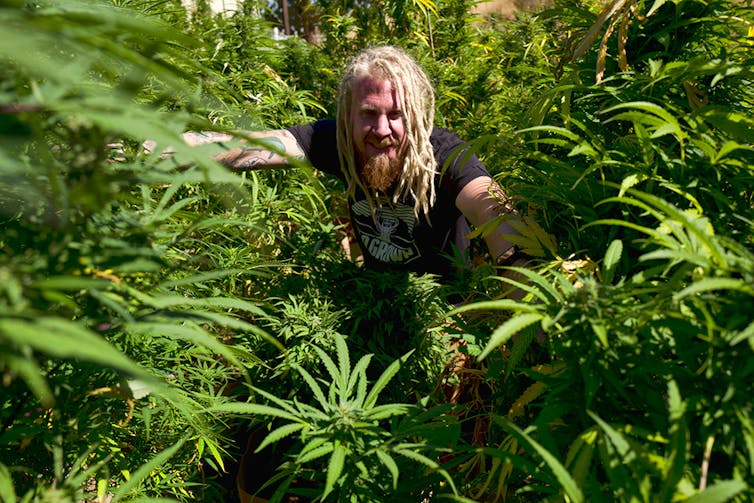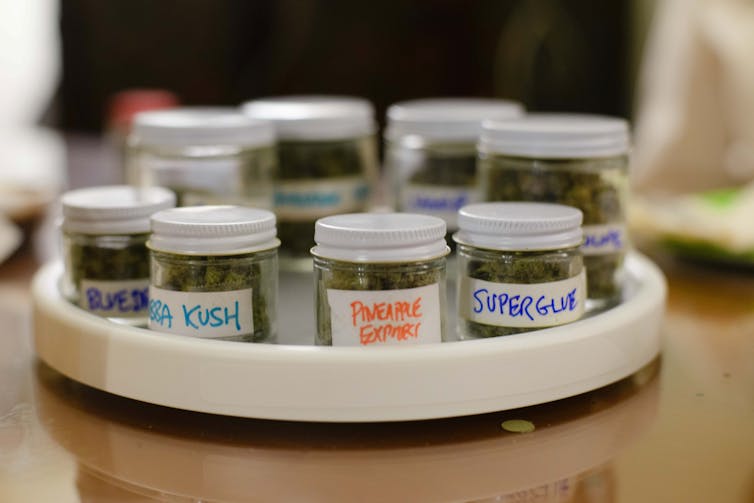Can artisanal weed compete with 'Big Marijuana'?
- Written by Ryan Stoa, Associate Professor of Law, Concordia University School of Law
You’ve heard of Big Pharma and Big Tobacco. How about Big Marijuana[1]?
The drug’s growing legalization[2] is raising concerns among small-scale marijuana farmers and retailers that the corporatization of weed may be right around the corner.
For example, earlier this year NASDAQ became the first[3] major U.S. stock exchange to list shares of a marijuana production company. And in August, Corona-maker Constellation Brands shocked Wall Street by making a US$3.8 billion investment[4] in a Canadian marijuana producer, sparking a bull market in marijuana stocks industry-wide. Even Coca-Cola is exploring opportunities[5] to get involved.
Corporate and Wall Street interest in weed is only going to increase now that three more states[6] have legalized recreational or medicinal marijuana use – bringing the total to 33 – while Canada recently became[7] the second country to allow recreational uses of the drug.
I have studied the marijuana agriculture industry[8] for the past several years, tracing its evolution from black market drug to legal intoxicant. It’s a story I tell in my book[9], “Craft Weed: Family Farming and the Future of the Marijuana Industry.”
With all this money pouring in, it’s fair to wonder how legalization will change the marijuana industry itself – and whether it can stay true to its hippie roots.
 Canada legalized recreational marijuana earlier this year.
Reuters/Carlos Osorio[10]
Canada legalized recreational marijuana earlier this year.
Reuters/Carlos Osorio[10]
Small origins
One of the unintended consequences of the federal prohibition on marijuana in the United States is that legal pot-related businesses have remained rather small.
The American marijuana farming scene, for example, has been dominated by small outdoor farmers and modest indoor warehouse growers. The alternative - large, market-share-dominating companies - would attract the attention of federal authorities.
State governments have recognized a public benefit to keeping farms small and local as well. In California, for example, most marijuana farming licenses[11] are granted to farms limited to no more than one acre of marijuana.
The federal prohibition also prevents farmers, distributors and retailers from engaging in interstate commerce, meaning that states that legalize marijuana use must create their own local markets for homegrown small businesses to operate in.
 California cannabis farms like Steve Fagan’s can not be larger than an acre.
AP Photo/Richard Vogel
California cannabis farms like Steve Fagan’s can not be larger than an acre.
AP Photo/Richard Vogel
Moneyed interests
But as the legal marijuana industry booms, well-heeled companies and investors are trying to corner the market.
According to one estimate[12], consumer spending on legal marijuana products in the U.S. reached $8.5 billion in 2017, up 31 percent from the previous year. Spending is projected to reach $23.4 billion by 2022.
For comparison, beer sales are actually declining[13]. Although total sales were a robust $111 billion in 2017, that was down 1 percent from the previous year.
Such rapid growth in the marijuana market may not be surprising, given that two-thirds of the U.S. population can now use marijuana medicinally or recreationally up from none just over two decades ago, based on my own analysis.
As a result, retail stores are becoming bigger and bolder, with chains competing to establish themselves as the Starbucks of the marijuana industry.
One of these is Seattle-based Diego Pellicer, one of the first[14] marijuana companies to market itself as a premium brand retail chain. For now, the company’s model rests on acquiring real estate and securing deals with marijuana retailers willing to operate their business under the Diego Pellicer name. That way, if the federal prohibition is ever lifted, Diego Pellicer will be in prime position to dominate the retail market.
The immense growth potential is also attracting private equity and other investors, some of whom are partnering with celebrities[15] whose names are linked to pot smoking. In 2016, for example, a private equity firm partnered with the Bob Marley estate[16] to launch the Marley Natural line of marijuana products.
Patents are seen as another way a few giant companies may come to capture the pot industry. Increasingly well-funded laboratories[17] are developing new strains of marijuana[18] at a rapid pace, with varying degrees of strength and hardiness as well as unique psychoactive and flavor profiles.
As the U.S. Patent and Trade Office begins[19] to issue patents[20], there are reports[21] of companies attempting to gobble them up.
Finally, many in the agricultural sector of the marijuana industry are predicting and bracing for[22] an agribusiness takeover – though this has yet to happen.
 A staggering number of marijuana strains have been developed.
Reuters/Randall Mikkelsen[23]
A staggering number of marijuana strains have been developed.
Reuters/Randall Mikkelsen[23]
How craft weed can thrive
Are marijuana veterans right to be concerned that their industry is moving too rapidly[24] from the black market to the stock market?
Yes and no. My own research[25] suggests that a local, sustainable and artisanal model of marijuana production can co-exist with Big Marijuana – much as craft beer[26] has thrived in recent years alongside the traditional macro breweries.
One reason is that whereas the illicit drug trade forced consumers to buy ambiguously sourced marijuana from street dealers, the legal market allows consumers to buy a wide variety of marijuana products from legitimate retail businesses. And more and more[27] consumers are turning to edibles and extracts produced by highly specialized manufacturers.
The staggering number[28] of marijuana strains being developed is creating a connoisseur culture that favors small-scale, artisanal farms that can nimbly adapt to shifts in market demand. Because such farms can market themselves as small, sustainable and local, they can better reflect 21st-century food movement ideals.
Besides efforts at the state level to limit the size of farms, another regulatory approach is the use of appellations to encourage an artisanal pot culture. I have argued[29] that the marijuana industry is well-suited to adopt an appellation system, like you find with wine and cheeses.
Just like a Bordeaux wine comes exclusively from that region of France or Parmigiano-Reggiano is named after the areas of Italy where it originates, Humboldt marijuana may become a prestigious and legally protected designation of origin for marijuana products grown or produced in Humboldt County, California.
It is probably inevitable that Big Marijuana will take hold in some form, but that doesn’t mean the market can’t support the small businesses that have enabled marijuana to become a uniquely local and artisanal industry.
References
- ^ Big Marijuana (learnaboutsam.org)
- ^ growing legalization (theconversation.com)
- ^ became the first (www.fool.com)
- ^ US$3.8 billion investment (www.forbes.com)
- ^ exploring opportunities (www.bloomberg.com)
- ^ three more states (www.wired.com)
- ^ recently became (www.nytimes.com)
- ^ marijuana agriculture industry (papers.ssrn.com)
- ^ my book (mitpress.mit.edu)
- ^ Reuters/Carlos Osorio (pictures.reuters.com)
- ^ marijuana farming licenses (static.cdfa.ca.gov)
- ^ one estimate (arcviewgroup.com)
- ^ actually declining (www.brewersassociation.org)
- ^ one of the first (nymag.com)
- ^ celebrities (money.cnn.com)
- ^ partnered with the Bob Marley estate (www.theverge.com)
- ^ laboratories (phylos.bio)
- ^ strains of marijuana (www.leafly.com)
- ^ begins (www.forbes.com)
- ^ issue patents (www.law.com)
- ^ there are reports (www.gq.com)
- ^ predicting and bracing for (www.wired.com)
- ^ Reuters/Randall Mikkelsen (pictures.reuters.com)
- ^ moving too rapidly (www.pressdemocrat.com)
- ^ My own research (papers.ssrn.com)
- ^ craft beer (theconversation.com)
- ^ more and more (arcviewgroup.com)
- ^ staggering number (www.leafly.com)
- ^ I have argued (theconversation.com)
Authors: Ryan Stoa, Associate Professor of Law, Concordia University School of Law
Read more http://theconversation.com/can-artisanal-weed-compete-with-big-marijuana-106509

